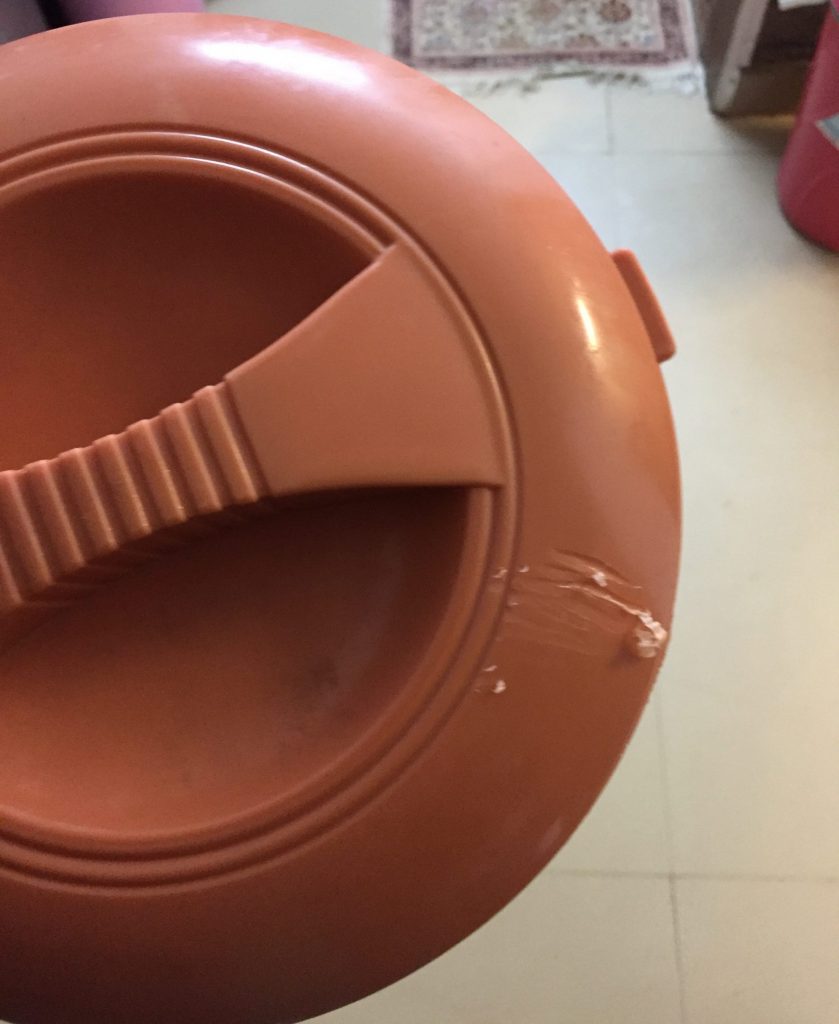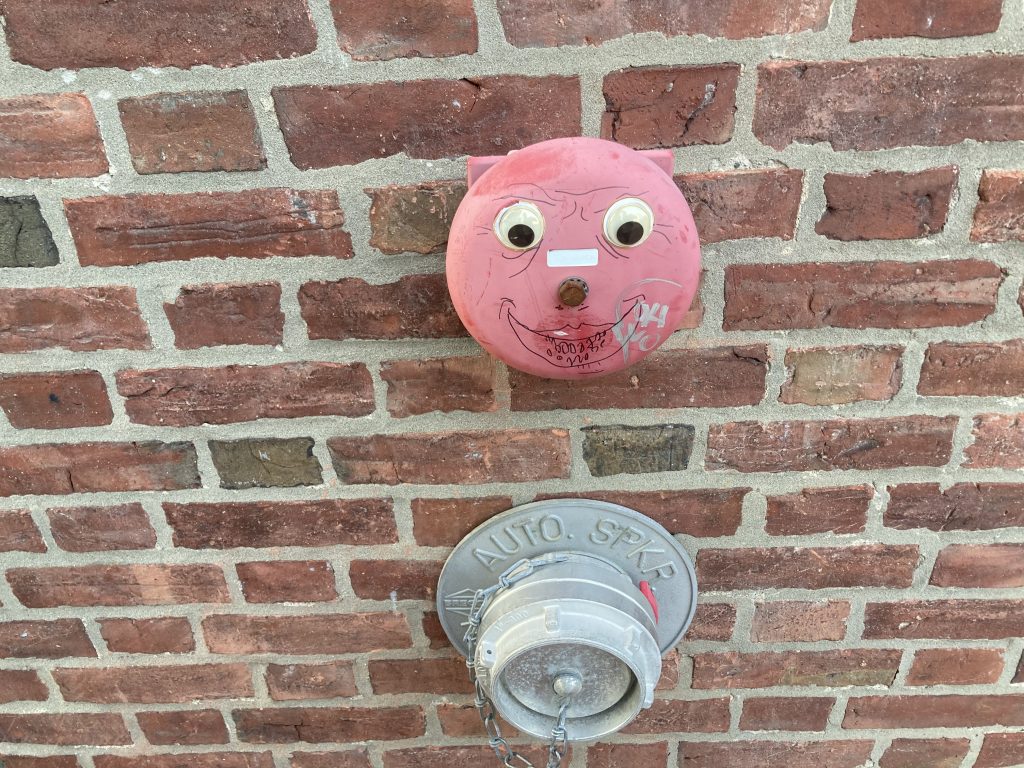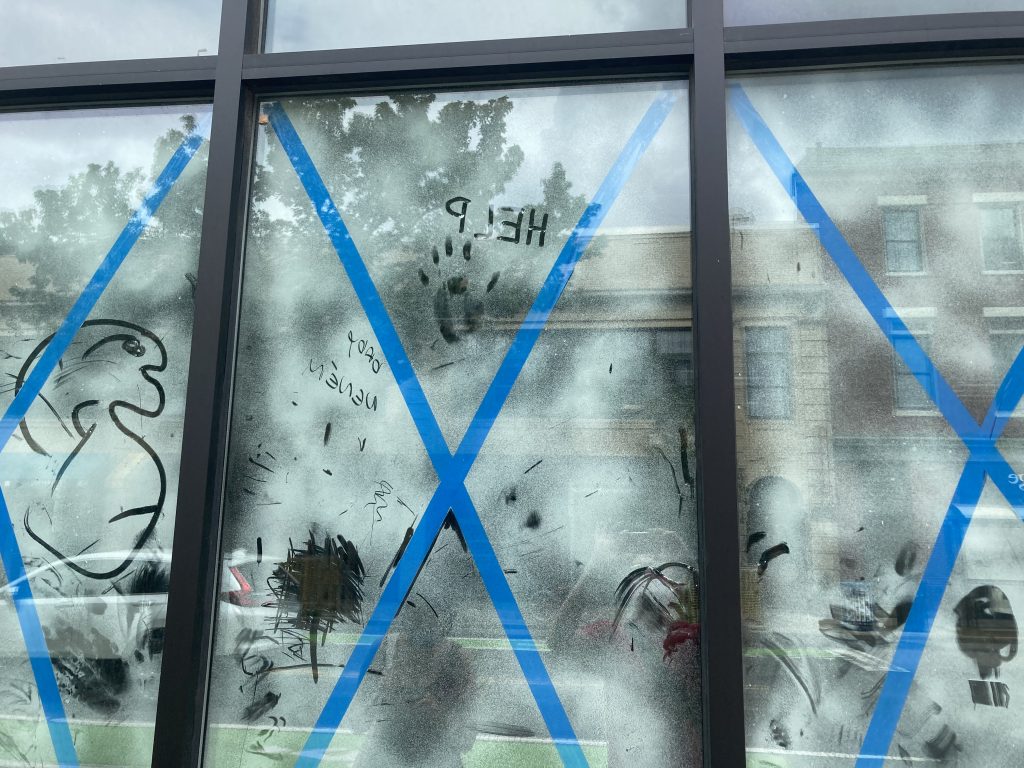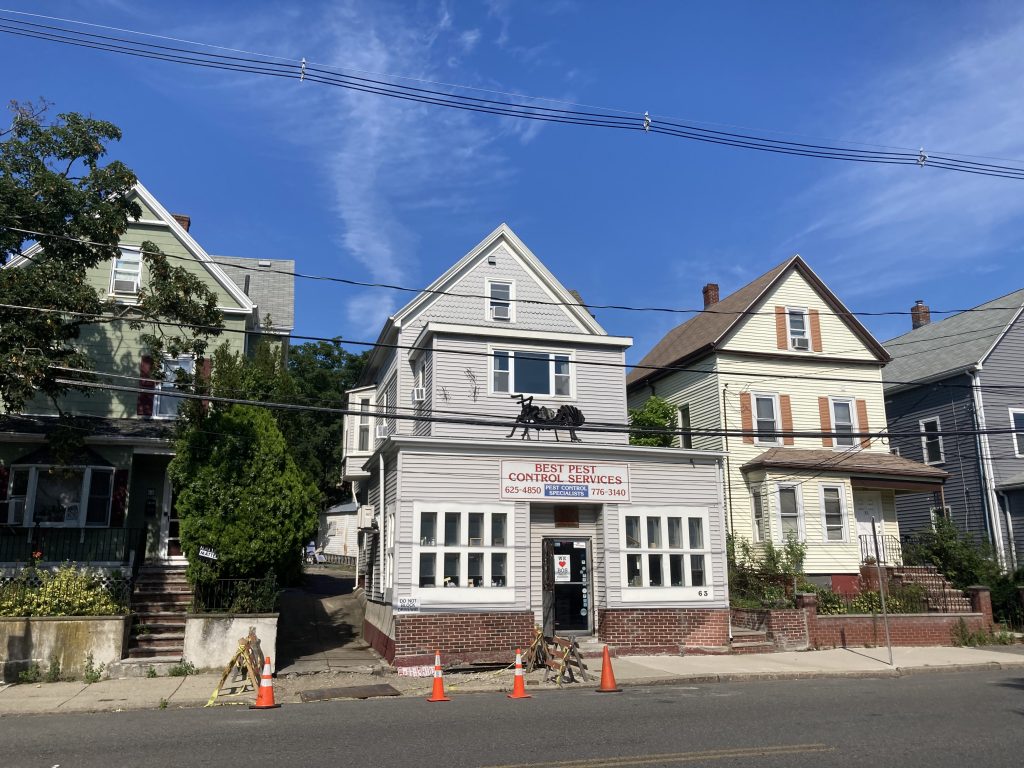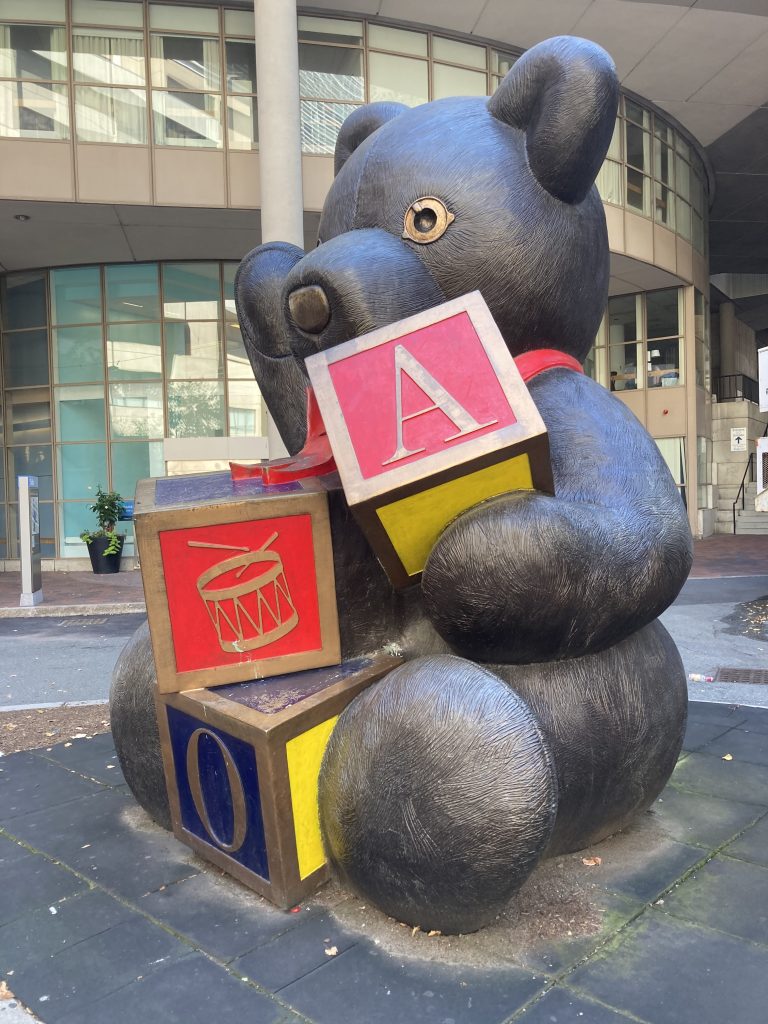
‘‘The Spin Doctor’ regional chain of laundromats is centered in the southeast, though one-off branches and knock-offs can be found in most states east of the Mississippi. Mundane in every other way, ‘The Spin Doctor’ machines are equipped with a four-hour deep-clean setting that can be triggered by straddling the line between the ‘regular’ and ‘delicate’ cycles precisely before punching the quarter tray in. Watching the clothes spin through the glass, one will reportedly come to terms with a small, unfortunate event that occurred while wearing a garment inside.
By no means does the deep clean erase the event from history or from the minds of those who witnessed it. The ‘clean’ is for the traveler, alone, who will either see the embarrassment from an angle that greatly minimizes its impact or realize, suddenly, that they had misremembered some forgivable context. The garment will emerge in tatters but the traveler will have one fewer intrusive thought needling them as they try to sleep- a cheap trade for those who find the service even remotely compelling.
Rumors suggest several ways in which one might bolster the deep clean for those particularly guilty memories. Quarters minted in the year of the event are said to be lucky in this regard. Sitting close to the machine as though rot-your-brain staring into a television keeps interruptions to a minimum. Some find comfort in keeping a video of the process in their phone, the loops of which can be streamed in 10-hour intervals, a lo-fi, ASMR niche all its own.’
Seventeen years ago I was a high school freshman who thought football might make him a better man. It did not, and I spend a night or two each month reliving the afternoon that taught me it wouldn’t. It doesn’t help that I still carry around the school colors in the form of a worn-thin athletic quick-dry t-shirt. I’ve worn and washed it often enough that the stains, at this point, are well-set. Into the washer it goes.
Four hours is a long time to watch a machine and I don’t feel particularly cleansed of that afternoon when its buzzer jolts me from a reverie. I collect the jersey, now a handful of mulch, and stretch. I sleep soundly in the first evening, at least, contented with having tried.
-traveler
‘The trouble with bees (discounting the larger, extinction-level problem) is that one never quite knows where they’ll show up. The internet has allowed for an intermittent symbiosis to form between farmers and apiarists, the farmers appreciating the bees for their pollinating and the beekeepers playing an underhanded game of global chess with their queens.
For all that the Wayside is already chaotic, the shifting bee colonies add another layer of uncertainty to a tour that may already be fraught. One may have prepared bundled offerings of black catnip for the ashen specters of ‘The Immolated Kat Cirkus’ but to complete the tedious peace ritual for feline phantoms between boxes of nervous honey bees? Or to stumble upon a hive at the ‘The Undisclosed Peak’ while waiting for a glimpse of America’s secret second moon? Bees are happy to sting in the dark, reader, by moonlight, by daylight, in storm and sun. Bees are the postal service of the natural world, endangered, yes, but persistent even in the face of extinction.
And, like their honey, bees have a tendency to pick up on the local flavor.
It is good common sense to refrain from opening strange boxes or exploring ruined buildings, if for no other reason than for the minimal chance either currently houses bees. Much of what could be considered good common sense would suggest avoiding these destinations altogether. Whilst ignoring common sense, the author offers this piece of advice to the traveler: speak softly and carry epinephrine.’
Ah, stupid. I’m sure I’ve flipped by this little warning a hundred times and ignored it. Had I absorbed any of what it said I may have:
1. Ignored a moonlit field of mysterious boxes might portend.
2. Remained on-book, rather than thinking I had somehow discovered a Wayside oddity not already covered inside.
3. Done a better job washing the corn syrup from myself.
Hector is worse than me in most of these regards. He moves through the field with blithe abandon and doesn’t seem to mind that his skin crawls with insects. Could be that the rabbit and the bees understand neither is a threat to the other. Could be that his skin is thick enough that he doesn’t notice or that the stingers pose no threat at all.
I don’t consider myself thin-skinned, exactly, but compared to the tan rabbit I am not so ready to go about my business when I understand what all the itching is. Something instinctual (or, perhaps, something layered-in by cartoon tropes) warns that bee stings are a bit like dominoes- there is either peace or disaster. I move slowly and in the moonlight I confirm that the bees have mostly snuck under my sleeves and the cuffs of my jeans to get at the corn syrup from North Dakota. It seems reasonable to assume they’ll leave once the residue is licked, chewed, or otherwise mandibled away.
It’s a long process- an evening I spend standing stock-still, trespassing in a moonlit field. By sunrise, the bees have mostly dissipated and those that remain are happy enough to be brushed away by a gentle hand. Hector has fallen asleep between my feet and he kicks fitfully when I gather him from the dewy grass. Out of the corner of my eye a figure moves, a second scarecrow thawed in the sun.
The woman observes me from across the field and I stare back at her, the each of us wondering whether it would be therapeutic to discuss our misadventure or if we’d rather pretend it never happened. She chooses the latter, with a shrug, and then winces at something underneath her jacket- a bee sting, I guess.
I imagine her eyes widen. I imagine a pulse of adrenaline to her stiff legs. I imagine because I’m too busy running, myself, Hector an unwieldly football in my arms.
-traveler
‘Oil rigs chug a little slower deep in the American mid-west where the fruit of the ground is not black-gold but golden-gold, known less colloquially as ‘corn syrup.’ Commonly mistaken for a processed form of the surface-dwelling corn plant, ‘corn syrup’ earns its name for a tendency to pool under the same prairies atop which maize and its distant cousins tend to thrive. It is a viscous bruise hidden beneath the majority of American crops.
The straightforwardly named ‘Space Flower Theory’ posits that corn syrup is this world’s nectar and humanity, reimagined as a sort of swarming, drone-like species, is simply a medium for Earth’s essence. Corn syrup is the reward we earn for pouring non-renewable resources into unsustainable growth, which seems counter-intuitive at first but, ‘Space Flower Theory’ explains, is actually quite natural. The sooner we burn the planet down the sooner humanity will feel compelled to leave it. In doing so, we cross-pollinate the cosmos.
Though the name reeks of a new-age crystal rubbing, ‘Space Flower’ believers present as ‘down-to-earth.’ In reality, they are simply apathetic. Reading between the lines, it isn’t difficult to see that ‘Space Flower Theory’ is a thin, possibly sarcastic means by which a person might downplay the importance of individual responsibility for global crises. Any one who subscribes to the theory was looking for an excuse to forgo recycling when they found it and the same can be said for the majority of those who are able to describe it with a straight face.
The only discerning factor between the arm-chair ‘Space Flower Theorist’ and the zealot is the completion of a pilgrimage to the corn-syrup fields outside Omaha. They make no excuse for climate change, substitute an aggressive nihilism for the amateur’s lethargy and strive, in all actions, to salt the earth where it’s wounded. Their ritualistic destruction of farmland over a corn syrup reservoir results in what is often called crop circles. They hope, one day, to become the spacefarers we wish they were.’
‘The Syrup Fields’ aren’t much to look at. It’s autumn, so the rigs are definitely moving slower for all that the subterranean syrup has thickened in the cooling dirt, but they haven’t slowed, yet, to the notable winter crawl and the tempo is not so different from the mid-summer fly-fest videos I pull up on my phone. Hector licks wildly at the ground, the only indication that this is anything but an oil town and eventually I have to wipe down the rabbit’s sticky underbelly and shove him in the kennel. I don’t know that corn syrup is bad for him but, considering the number it’s done on the human populace, I feel comfortable making an educated guess.
Stupidly, perhaps, I sneak past the no-trespassing signs for a closer look and, shortly thereafter, I am running through a cornfield, pursued by a farmer with a gun. The web-strings of cooled syrup that form nearer the rigs collect on my face and make it difficult to open my eyes and to see through them once opened. I lick strands from my lips, sickly sweet and yellow across my skin.
Hector and I make a tidy escape, the farmer-cum-rig-operator emerging from the field in time to kick dirt at the bike as we swerve back onto the road. I doubt he would have taken the shot, but I drive a long ways before stopping again to shove a pocketful of sweetened kernels into the kennel and to wipe syrup from the handlebars. I suppose this counts as a fleeting bout of apathy and I wonder, idly (and idling) whether its onset is due to the corn syrup’s proximity or if the two are somehow comorbid, the seeking out of the Midwest and the carelessness with which we live.
-traveler
‘Imagine the frustration of the children who came of age near ‘Bellamy Forest,’ where the animals grow second heads and drop them like a hats in the wind. It must have been difficult, for that first batch, to describe these deliberate dismemberments and be chided for telling stories.’
Hector and I rent a deer stand for an evening in ‘Bellamy Forest.’ The agreement suggests that sleeping in the stand is against regulations, though, staking out the forest late into the night is just fine and I doubt the people in charge make a habit of wandering around and scaring off game. I take my chances and roll out a sleeping bag, knowing I’ll fall asleep at some point whether it’s intentional or not. Once I’ve blocked out the spaces in the walls where Hector might blindly wander off the tree, I retrieve an old pair of binoculars and settle myself into a meditative quiet.
I’ve seen pictures of the ‘Bellamy Forest’ animals and don’t exactly savor seeing them in life. It isn’t just spare heads they grow, though it’s the most common mutation among deer. The squirrels and raccoons slide out of redundant skins or run off without their tails. The rabbits grow extra feet, sometimes looking like furry little centipedes. Something in the biology of Bellamy animals has come to a decision regarding what part of the animal it is that draws hunters to it and the animals have evolved to provide it non-fatally. When a Bellamy deer is startled it drops an extraneous head, a glassy-eyed husk, and it bolts off in the opposite direction. Timed correctly, a gun shot will trigger this effect in a gathered herd, leaving a field of hollow relics.
But that would be quite the faux pas.
Evolution got it about half right. I don’t own a hunting license and don’t make a habit of keeping up with the hobby, but I know that Bellamy Forest has only become more of a destination, now. A hunter can prove their worth, here, by executing a kill before the animal has time to drop whatever extra part it grows. A two-headed deer graced the lobby of the lodge where I rented my ticket, for instance, and the placard nearby pointed out the seamless connection of the second head- a perfect Bellamy kill.
That’s what nature has a hard time anticipating. It understands killing for the sake of something, even for the sake of something as abstract as a trophy, but sometimes we kill for the sake of the kill and there’s no outmaneuvering that.
Rumor has it that the ‘Bellamy Forest’ mutation is already dying out, not for overhunting, given that licenses are tightly controlled, but because the quick-trigger evolution of the place has seemingly grasped its failure and gone back to the drawing board. The vestigial pieces of newborns have become wilted, half-formed, and much less likely to drop. The sheer ugliness of the new creatures has already dented hunting business which is why I slid so easily into a last-minute stand rental.
Around dusk a two-headed deer sidles into the clearing below Hector and I. The second head is unmoving, its mouth slightly open and its eyes gaping wide. It looks exactly like the sort of think one might mount over a hearth, a perfect, if naïve, negotiation on the part of nature. When Hector knocks over my bag (surreptitiously digging for carrots) the clattering startles the deer and the second head slips off into the grass. I just catch the bare patch of hide on the animal as it bounds away.
Hector, behind me, has settled into a corner with his treat. I wonder if he knows he’s done the deer a favor or if he was just working under the same impulse that drives the hunters to stalk their prey.
-traveler
Sometimes you notice a thing in Shitholes and it gets under your skin- that’s proving to be the case with ‘The Itch.’ Detailed in one of its hundreds of sidebars (each seemingly unrelated to the page’s major content) Shitholes defines ‘The Itch’ as the disease of a long-term traveler because it involves the sort of knowledge one picks up only after having traversed the same routes over and again. ‘The Itch’ is the flipside to American nostalgia- a symptom of having one’s favorites places spread across the country rather than confined to a neighborhood. My favorite burrito place is a thousand miles away from where I get my favorite pizza-by-the-slice. The natural places I turn to for quiet are always just out of reach and I always seem to come upon them in autumn, when the chill makes it difficult to stay still for long.
‘Long-haul trekkers beware of ‘The Itch,’ or, perhaps, be aware of ‘The Itch’ for ‘The Itch’ is not something that can be avoided so much as it is a thing worth understanding as inevitable. Early in a distance endeavor, there is a sense of one’s desires falling by the wayside and that absence brings about a spiritual coherence, for a time. In truth, one finds themselves searching for those same desires years later, treading and re-treading old paths in order to find them where they seemed to have landed.
‘The Itch’ is so named for its awful persistence and for its tendency to worsen the longer one indulges in scratching. Cut your nails, traveler, and grit your teeth and look back only when you believe something is following you.’
Reading between the lines, Shitholes seems to prescribe abstinence for ‘The Itch,’ a condition I am already intimately familiar with. I have kicked worse habits through feats of discipline and I have endured long years between fleeting romances. Abstinence in a realm or two is not the problem, for me, at all.
The problem has to do with all the small abstaining on the larger scale. How much will I need to give up to keep ‘The Itch’ mild? Does it mean never returning to an establishment I’ve visited before? Or does it mean never trying anything new so as not to instill further desires? I suppose I could curate my eating and drinking and even some of my recreation to national chains. One fast-food coffee is the same as another of its brand. That would keep ‘The Itch’ from spreading, I suppose, but I doubt it would quell it in the long term.
“Self-sufficiency,” I say, out loud, and the sound of my voice startles Hector. He hobbles over to see what the fuss is about, “If I could conceivably become the source of our favorite things,” I explain to him, “We would never miss a single thing.”
Hector thrives on rabbit food, clearance lettuce, and the occasional carrot. If I can continue to provide those things, he may have already seen the worst discomforts of his life. I suppose I’ll be the judge of that. Someday, hopefully not soon, Hector will be old and his discomforts will mount, again. They may, objectively, begin to approach his time in the sun room. If it comes to that, I’ll have to decide when enough is enough because, if I don’t decide, Hector will have no choice but to endure.
‘The Itch’ is a matter of endurance and I’m increasingly of the opinion that the same could be said of this project. I wonder if I will someday be considered by someone in a place to judge my tolerance for discomfort and I wonder what they will factor into their decisions about the shape of mercy as it applies to me. Will I be a testament to discipline by then? Or will I be ruined?
-traveler
Rear View Mirror
- December 2025
- November 2025
- October 2025
- September 2025
- August 2025
- July 2025
- June 2025
- May 2025
- April 2025
- March 2025
- February 2025
- January 2025
- December 2024
- November 2024
- October 2024
- September 2024
- August 2024
- July 2024
- June 2024
- May 2024
- April 2024
- March 2024
- February 2024
- January 2024
- December 2023
- November 2023
- October 2023
- September 2023
- August 2023
- July 2023
- June 2023
- May 2023
- April 2023
- March 2023
- February 2023
- January 2023
- December 2022
- November 2022
- October 2022
- September 2022
- August 2022
- July 2022
- June 2022
- May 2022
- April 2022
- March 2022
- February 2022
- January 2022
- December 2021
- November 2021
- October 2021
- September 2021
- August 2021
- July 2021
- June 2021
- May 2021
- April 2021
- March 2021
- February 2021
- January 2021
- December 2020
- November 2020
- October 2020
- September 2020
- August 2020
- July 2020
- June 2020
- May 2020
- April 2020
- March 2020
- February 2020
- January 2020
- December 2019
- November 2019
- October 2019
- September 2019
- August 2019
- July 2019
- June 2019
- May 2019
- April 2019
- March 2019
- February 2019
- January 2019
- December 2018
- November 2018
- October 2018
- September 2018
- August 2018
- July 2018
- June 2018
- May 2018
- April 2018
- March 2018
- February 2018
- January 2018
- December 2017
- November 2017
- October 2017
- September 2017
- August 2017
- July 2017
- June 2017
- May 2017
- April 2017
- March 2017
- February 2017
- January 2017
- December 2016
- November 2016
- October 2016
- September 2016
- August 2016

